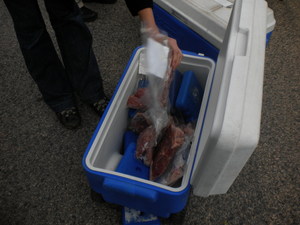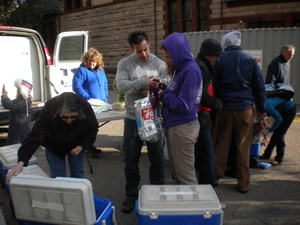
12/10/10
Slow
Food encourages buying local and organic foods, a practice generally associated
with produce. But that doesn't mean the movement limits a consumer's options to
fruits and vegetables alone.
Willow Blish, one of
Slow Food Boston's leaders, said "Slow Food in no way
pushes any particular 'diet' or eating pattern. We merely ask people to make
the best choices within whatever constraints they themselves choose to
establish."
Blish
herself is a vegetarian with vegan leanings for several reasons. She has some
digestive intolerances, a general distaste for meat and she objects to the way
that animal products are produced in the industrial food system. However, she
still buys some meat products for her family.
There are several ways to obtain meat from local farmers in
Boston. Some Slow Food enthusiasts purchase shares of Community Supported
Agriculture (CSA), while some choose less formal ways of supporting local
farms.
Personal
chef JJ Gonson is a self-proclaimed locavore, using mainly fresh and local
ingredients in the meals she prepares. She is the co-sponsor of an unofficial
event called a "Meat Meet" along with Stillman's at the Turkey Farm. Meat Meets
bring a variety of local, organic meat to meat-lovers in Boston.
Three
years ago, the event started as an impromptu meat purchase between Gonson and
Stillman's Farms. It has since grown into a popular, semi-regular gathering.
Roughly once a month during the winter months, Stillman's drives a selection of
meats out to Cambridge and sells it out of the back of a truck in a parking lot
for anyone who's interested.
The
benefit for patrons is easy access to farm-fresh meat that they wouldn't have
otherwise had.
Mathieu
Lalonde, science safety officer in Harvard's Department of Chemistry and
Chemical Biology, belongs to Chestnut Farms' CSA in Western Massachusetts and
attended his first Meat Meet in October. He said he's passionate about the
health benefits of meat when it's raised properly.
"I
like to shake the hands of the farmer, ask some questions, see the ingredients
and know that I'm encouraging small farms that are going back to the old way of
doing things right," Lalonde said, "and getting higher-quality meat as a
result."
"I
eat about a pound of meat per day. So my CSA share is 20 pounds per month.That
lasts me three weeks," he said.
Buying
large quantities of local meat can be expensive. That's why Rosemary Melli,
regional governor of Slow Food in New England, suggests buying small amounts at
a time.
"When
you first look at that meat you'll say, 'Oh that's too expensive,'" Melli said.
"But don't buy a lot of it, sometimes I just use it as a condiment."
The Meat Meets provide convenient access to local, organic meat but also a place to socialize with other like-minded eaters, and to share experiences and ideas.

Justin
Powers, a local-meat lover, said he participates primarily for the nutritional
benefits.
"I
think that raising meat this way with grass-fed animals is a safer way to raise
it," Powers said. "Without having it in this factory-farm kind of environment
you don't have animals getting sick, you don't have them pumped with hormones.
And also being grass-fed, they get omega-3 fatty acids which is something
that's really missing from a lot of people's diets."
Powers
said that socializing with fellow Meat Meet goers was also a big part of the
fun.
Along
with buying fresh and local, Slow Food emphasizes the enjoyment of food in a
community setting as one of its core values.
Co-organizer
and Harvard Law student Nate Rosenberg said the communal aspect of the Meat
Meets is a crucial part of why they're successful.
"People
who like food tend to be social," he said, "food is kind of a common
denominator."
An asenwr from an expert! Thanks for contributing.